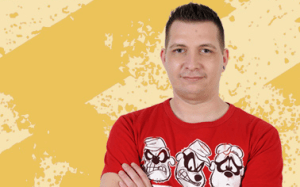In this interview, he talks about the overload, everyday life in the day clinic and the time off he allows himself today.

René, you burned out a few years ago. What was the reason for this?
My burnout came from my job: I was absolutely unhappy at work and at the same time had so much to do that it would have been enough for three.
What were the signs that something was wrong?
There were many: I couldn't sleep at night because my mind was racing. I was so tired during the day that I couldn't concentrate and couldn't get much done. I also had migraine attacks or dizzy spells with the feeling that I was about to faint.
My private life really only consisted of lying on the couch and trying to get some sleep. I also completely cut myself off from my friends.
When did it become clear that things couldn't go on like this?
It wasn't so clear at first. It took a year and a half from the first signs to the point where I said to myself, "Something has to happen now!". So I wandered around like a zombie for a year and a half. I just didn't want to and couldn't do it anymore. But I wanted my strength back. I wanted to be "me" again ...
How did you manage that?
Somehow I thought quite logically: what options do I have in my neighbourhood? I then surfed the internet and searched for "psychologist" and "psychiatrist" and "burn-out centres".
And then?
I called a psychiatric outpatient clinic to arrange an initial consultation. I had pinned all my hopes on it. And I was really relieved after the interview. Beforehand, I thought they were going to say "you're crazy" or something like that.
In the first interview, I was then shown the options that were possible for me: These ranged from counselling therapy to an acute clinic and psychiatric medication. I was most afraid of the pills. After a second discussion a week later, it was clear that I wanted to go to a day clinic. And another week later it was clear that I would also take pills.
What did you do at the day clinic?
As the name suggests, I was in this centre during the day and was looked after there. Initially, it was about reorganising myself and my everyday life. For example, we had breakfast and lunch together - including kitchen duties. Or we went on excursions or did sports. Then there was counselling therapy and art therapy, where I started painting.
When did you realise that things were looking up again?
It didn't happen overnight. But after three to four weeks in the clinic, I realised that something was happening. The tablets were working and I had the feeling that I wasn't alone. There are others who are as miserable as me.
And so it went on step by step. After 11 weeks in the day clinic, I was gradually reintegrated into my job. At the same time, I applied for rehab in order to stabilise my psyche permanently. After two months of rehab, many things changed: I quit my old job, started studying social pedagogy and moved to another city to do so.
How are you feeling today?
I'm fine! And I'm also kind of happy about this experience. Sure, I don't know what my life would be like if the whole thing hadn't happened to me.
A lot has definitely changed for me. Not only have I started a new degree programme, I also have a different view of money and status symbols today. Of course I treat myself, but that means less to me now than it used to. All in all, the burn-out was drastic. Today I say it's not worse than before, it's different.
Friends are really important. Even though I withdrew from all my friends at first, throughout the whole process I realised who was there and tried to be a support for me. I also met two people at the day clinic who were just as miserable as I was. We got on really well straight away. There was absolute trust, they could understand how I was feeling. There was an instant friendship - and it still exists today.
What also does me good is the voluntary work, including for ICH WEISS WAS ICH TU. It gives me structure and I'm out of the daily grind at the same time. And I listen to myself and my signals much more than I used to.
What does that mean?
I respond to my needs. I take time out when I need it. Then I cycle for an hour or sit in the park with a book or simply switch off my mobile phone. I used to go out with friends, even if I didn't feel like it. I don't do that any more.
Why do you talk so openly about your story?
Because it's a taboo subject, even though it shouldn't be. If you break your leg, you go to the doctor. And mental illnesses can also be treated. Nevertheless, you still hear people say things like "I'll be fine!", "It's not that bad!" or "I'm not a sissy!" That kind of attitude pisses me off. Because nobody needs to be ashamed of mental health problems.









